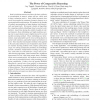Free Online Productivity Tools
i2Speak
i2Symbol
i2OCR
iTex2Img
iWeb2Print
iWeb2Shot
i2Type
iPdf2Split
iPdf2Merge
i2Bopomofo
i2Arabic
i2Style
i2Image
i2PDF
iLatex2Rtf
Sci2ools
152
click to vote
ICCV
2011
IEEE
2011
IEEE
The Power of Comparative Reasoning
Rank correlation measures are known for their resilience to perturbations in numeric values and are widely used in many evaluation metrics. Such ordinal measures have rarely been applied in treatment of numeric features as a representational transformation. We emphasize the benefits of ordinal representations of input features both theoretically and empirically. We present a family of algorithms for computing ordinal embeddings based on partial order statistics. Apart from having the stability benefits of ordinal measures, these embeddings are highly nonlinear, giving rise to sparse feature spaces highly favored by several machine learning methods. These embeddings are deterministic, data independent and by virtue of being based on partial order statistics, add another degree of resilience to noise. These machine-learning-free methods when applied to the task of fast similarity search outperform state-of-theart machine learning methods with complex optimization setups. For solving c...
Related Content
| Added | 11 Dec 2011 |
| Updated | 11 Dec 2011 |
| Type | Journal |
| Year | 2011 |
| Where | ICCV |
| Authors | Jay Yagnik, Dennis Strelow, David Ross, Ruei-sung Lin |
Comments (0)

